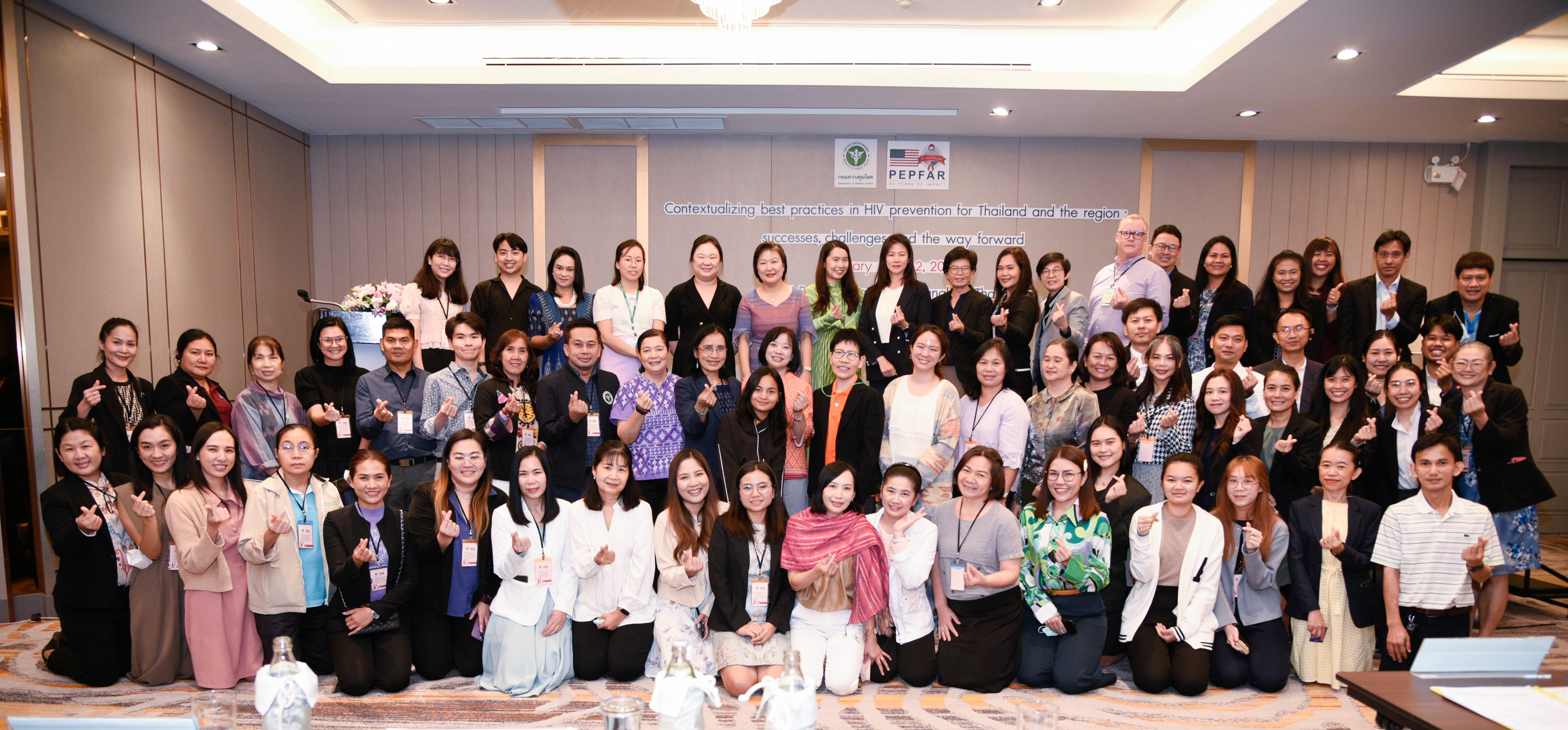The first quarter of this year has had some historic moments for the Global HIV Prevention Coalition (GPC). Harm reduction was included in the 67th Commission of Narcotic Drugs resolution; the GPC Resource Hub as well as the sixth progress report launched and many other key strategic engagements, meetings across partners, regions and countries have taken place to accelerate HIV Prevention efforts to achieve our collective global targets – detailed update is below.
Launch of the GPC report; HIV Prevention: From Crisis to Opportunity
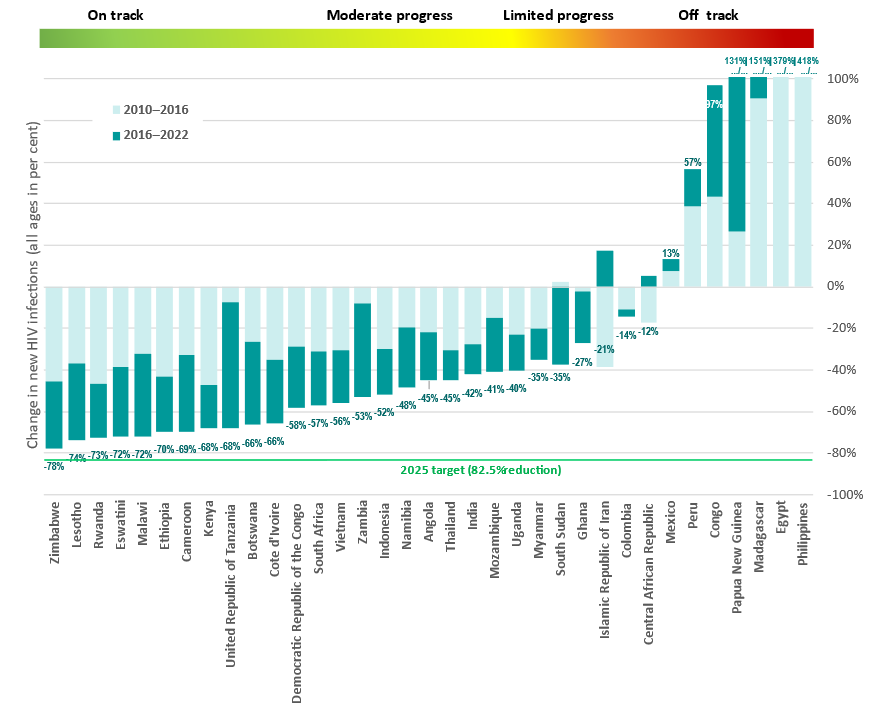
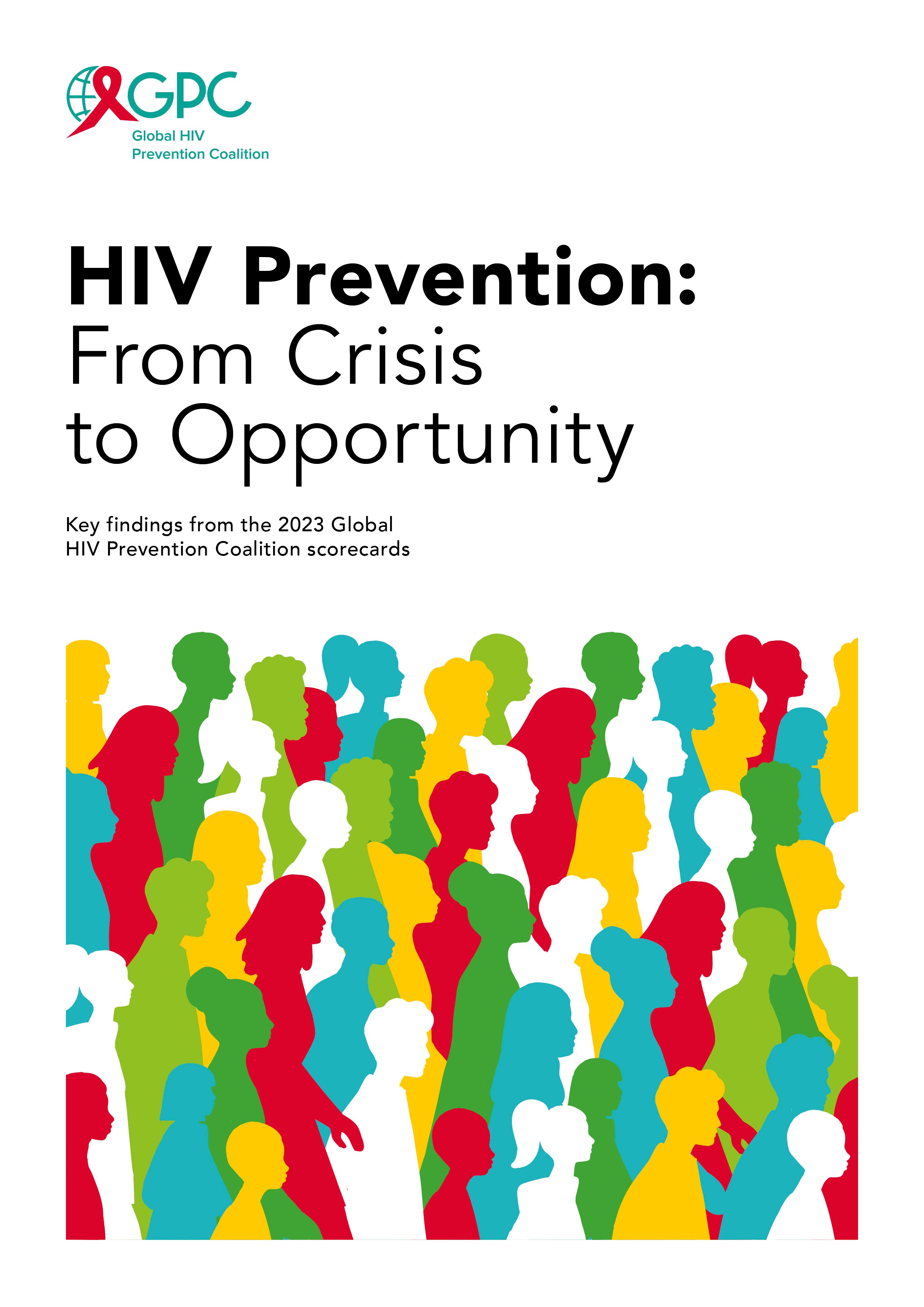
With less than two years left to reach the 2025 global HIV targets, on 13 March 2024, the GPC launched its’ sixth progress report alongside an executive summary highlighting 11 countries (Zimbabwe, Lesotho, Rwanda, Eswatini, Malawi, Ethiopia, Cameroon, Kenya, United Republic of Tanzania, Botswana, and Cote d’Ivoire) are on track to achieve the global target of an 82.5% reduction in number of new HIV infections compared to 2010; Reaching the 2025 and 2030 HIV targets requires steep reductions in new HIV infections among key populations and their sex partners. These populations accounted for 55% of all the new HIV infections in 2022, up from 44% in 2010; access to Pre-Exposure Prophylaxis has increased but there were only 2.6 million users in 2022 against the target of 10 million; persistent and widening gaps in basic HIV prevention such as: Condom promotion, harm reduction for people who inject with drugs and voluntary medical male circumcision for men and boys need to be urgently addressed. The report provides distinct recommendations towards effective HIV Prevention service delivery – underscores the importance of a user-centered approach in ensuring HIV prevention options are accessible to users by choice.
Launch of the GPC Resource Hub
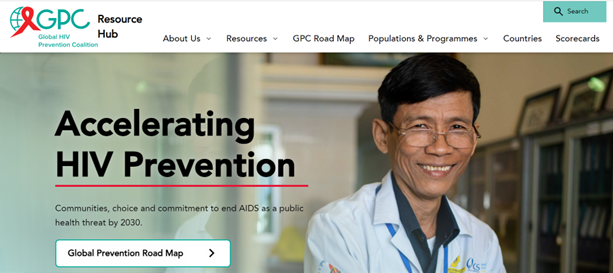
On 20 March, the GPC Resource Hub was launched as the main go-to site for all HIV prevention resources across the coalition and beyond. Key features include:
- an interactive HIV Prevention 2025 Road Map with resources for each of the 10 Roadmap actions.
- An overview of the GPC Architecture.
- Strategic HIV prevention documents for the GPC focus countries.
- Voluntary Medical Male Circumcision resources were migrated from the Clearinghouse on medical male circumcision for HIV prevention – the go-to source of information about voluntary medical male circumcision for the past 15 years – and have been integrated into the resource hub on the Men and Boys section.
- All coalition members may submit resources to be included in the hub using this form.
Advancing Drug policy Reform, Harm Reduction, and collaborative strategies
A historic day at the 67th Commission on Narcotic Drugs (CND) on 22 March 2024 in Vienna during the event: “The Intersection of Public Health and Law Enforcement: Advancing Drug Policy Reform, Harm Reduction, and Collaborative Strategies” – member states voted on resolutions for the first-time and including the concept of “harm reduction.” Read more here.
New series of HIV Prevention and Accountability reports
A series of new HIV Prevention & Accountability reports shed light on critical barriers that prevent people from accessing life-saving HIV prevention services. The reports from Frontline AIDS and more than 100 community partners across India and nine African countries show slow progress on reducing new HIV infections, with limited resourcing for tailored HIV prevention programs, including the roll-out of the dapivirine ring and PrEP at a large scale. Findings also highlight the impact of draconian laws and growing anti-rights movements on civil society’s ability to advocate for change effectively. The reports set out clear recommendations which National AIDS Commissions and other stakeholders can act on to achieve the global targets.
A high-level event: End Inequalities End AIDS – On the Fast-Track
The UNODC HIV/AIDS Section’s support for the high-level event “End Inequalities End AIDS - On the Fast-Track” reflects a concerted effort to address the transmission of HIV, viral hepatitis, and other blood-borne diseases among people who use drugs. The event, organized by Kenya and South Africa, aimed to review progress since 2019 and foster collaboration among stakeholders to find innovative solutions and share best practices. The discussions focused on overcoming legal and policy barriers, combating stigma and discrimination, and addressing funding challenges to effectively reduce disease transmission among this vulnerable population. The gathering of approximately 100 participants underscores the importance of such initiatives in the global health landscape.
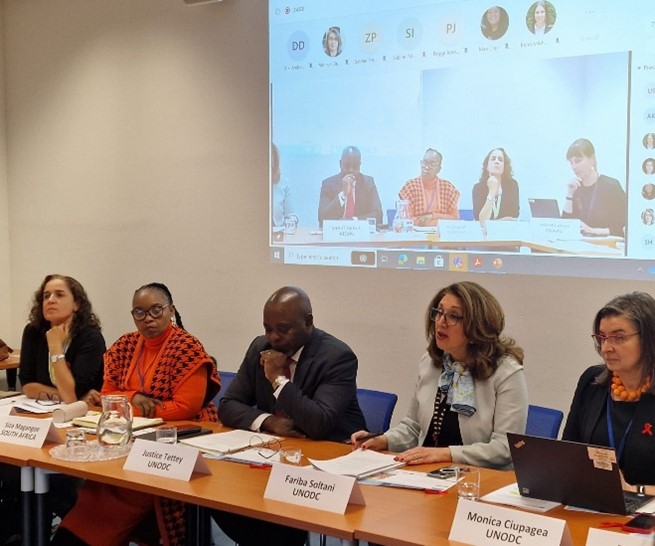
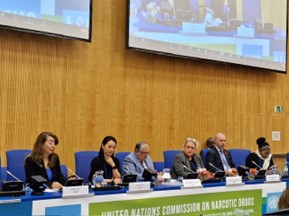
Gender-Based Violence against women who use drugs
Still at the 67th CND, UNODC organized an event, aiming to raise awareness of the scope and scale of Gender-Based Violence (GBV)experienced by women who use drugs (WWUD), and the connection between GBV and the HIV epidemic among them. It highlighted practical responses to violence that can be adopted by providers of HIV prevention services. The UN agencies: UNODC, WHO, UN Women, UNFPA and UNAIDS launched the Briefing Paper “Addressing gender-based violence against women and people of diverse gender identity and expression who use drugs” during the event. It provides background information on the topic, as well as recommendations and good practices to ensure that WWUD are not left behind.
Special Initiative to expand biomedical HIV Prevention methods
The International Planned Parenthood Federation (IPPF)has launched a special initiative to expand biomedical HIV prevention methods available at its Member Associations, which provide comprehensive, integrated sexual and reproductive health services. The first phase of this programme includes the rollout of injectable PrEP and the dapivirine vaginal ring, as well as expanding the availability of oral PrEP in Eswatini, Lesotho, Malawi, Malaysia, Thailand, Nepal, and India. This programme is a collaboration of a consortium of IPPF Member Associations, led by the Family Planning Association of India (FPAI). The inception meeting to kick off the consortium programme was held in New Delhi from 11-14 March 2024.
A study on HIV Prevention, treatment, care, and support in Prison settings
In 2024, UNODC launched the HIV/AIDS prevention, treatment, care, and support in prison settings project in South Sudan with an inception mission from 7 to 11 March 2022 and conducted rapid situation assessments of the six biggest prisons across the country. The assessments found that conditions in South Sudan’s prisons are in urgent need of improvement, including the medical units, which are all poorly equipped; the overall hygiene and sanitary conditions as well as access to health care in closed settings are likewise in need of immediate attention; and children accompanying their mothers and mentally ill prisoners pose significant issues. The ethical committee approved the study protocol, and the data from Juba prison was collected and is currently under review and analysis. The study will be finalized in the second quarter of 2024.
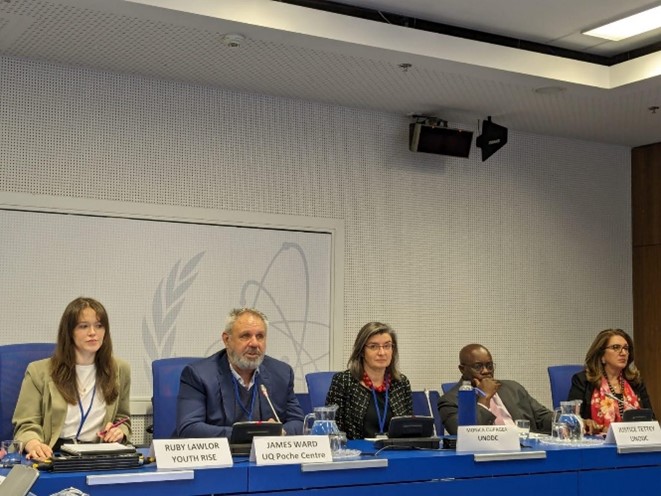
The 4th pre- Commission on Narcotic Drugs’ consultative meeting
The meeting was organized by the UNODC HIV/AIDS Section in collaboration with key organizations like International AIDS Society (IAS), International Network of People Using Drugs (INPUD), WHO, and UNAIDS. This meeting is part of an ongoing dialogue that began in 2021, engaging academia, civil society, and the community of people who use drugs. The annual consultation aimed to facilitate the exchange of information and sharing of knowledge. The focus of this year’s meeting was on HIV and Hepatitis prevention, treatment, and care for people who use drugs.
Training of Trainers HIV Prevention regional workshop for GPC countries and beyond
UNAIDS organized a Training of Trainers workshop for the new GPC countries and beyond in the Eastern and Southern Africa (ESA) region between 18-21 March 2024 in Antananarivo, Madagascar. Participants included Prevention Managers in the National AIDS Councils and Ministries of Health as well as any three coordinators of the HIV Prevention pillars depending on the country’s priorities. The workshop aimed at defined approaches for strengthening HIV combination prevention programming in countries and accelerating country implementation towards achieving the 2025 targets – similar training was conducted in West and Central Africa.
Rabat Declaration to advance Sexual and Reproductive Health and Rights
On 2 March, the participants at the 11th African Conference on Sexual Health and Rights signed the Rabat declaration to advance the sexual and reproductive health and rights (SRHR) of women and youth in Africa. This declaration is about broad SRHR, the political commitments on SRH education, and the principles of universal health coverage. Among other things, it recognizes the unique challenges faced by vulnerable groups and minorities in accessing SRH services; advocating for targeted initiatives and policies that address the specific needs of these populations; and calls for the removal of legal barriers that hinder people's access to SRH services.
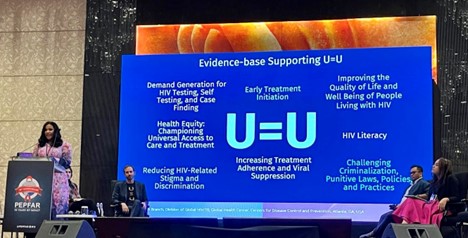
Scaling up Undetectable = Untransmittable (U=U) for HIV Prevention.
The Centers for Disease Control and Prevention (CDC), Division of Global HIV and TB debuted its forthcoming "Implementing and Scaling Up Undetectable = Untransmittable: A Resource Guide" at PEPFAR's Asia Regional Operations Planning Meeting in Manila, Philippines. Developed in collaboration with Prevention Access Campaign, the goal of the guide is to advance programs' awareness and understanding of how to use U=U to support 95-95-95, improve health equity, reduce HIV-related stigma and discrimination, and enhance technical expertise to implement, scale, monitor, and evaluate U=U. The plenary's success resulted in all 14 countries' inclusion of U=U activities in their FY 2025-2026 regional operation plan.
Training for young key populations in Asia Pacific
UNESCO in the Asia-Pacific region, via Youth LEAD, delivered a TeenGen Leadership training programme for Young Key Population (YKP) leaders in Asia Pacific on 29-30 January 2024; Parts of the training focus on HIV and SRHR. UNESCO is currently the co-chair of the Interagency Task Team on Young Key Populations in Asia-Pacific.
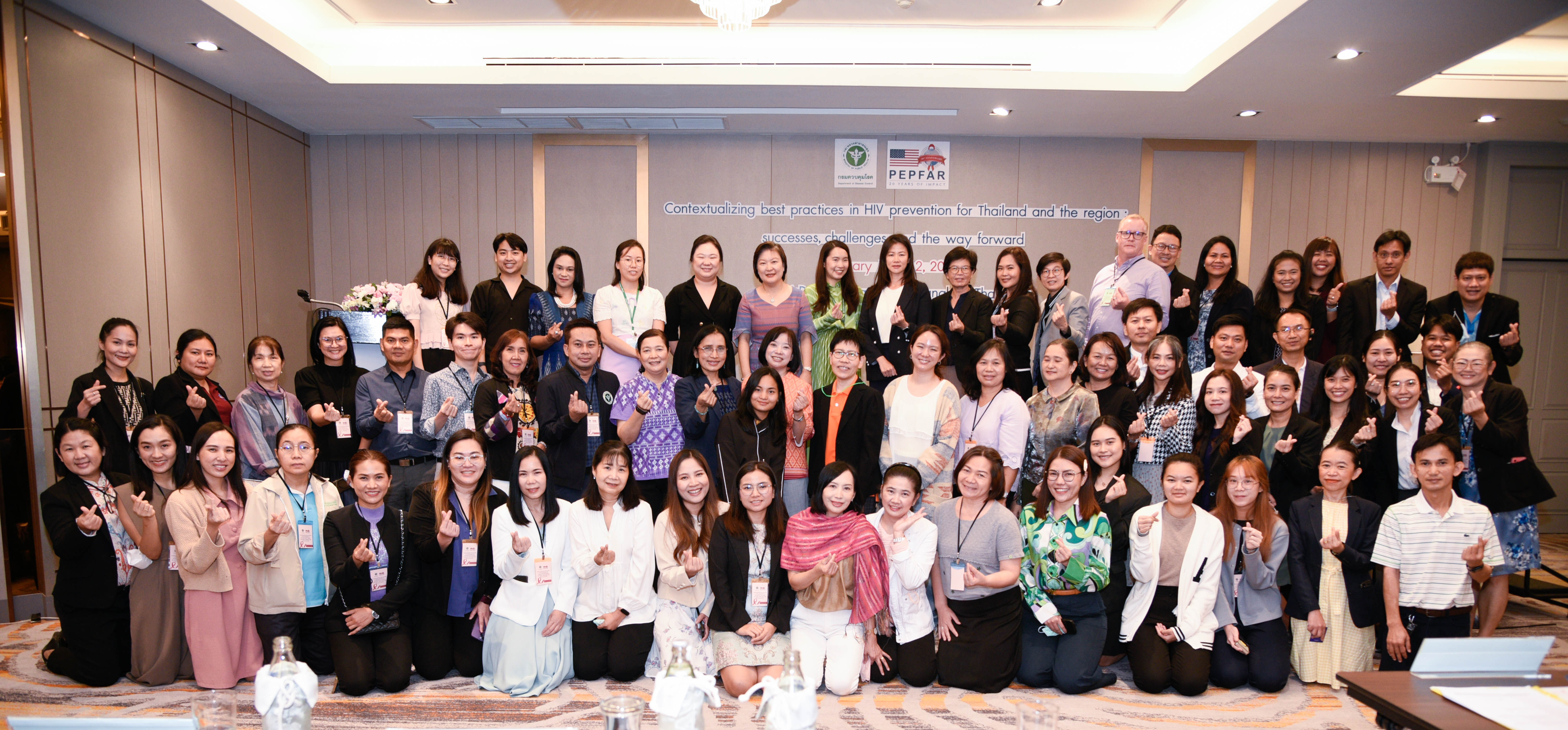
Contextualizing best practices in HIV prevention for Thailand and the region: successes, challenges, and the way forward.
Led by US-CDC, this event held between 10-12 January 2024, brought together policy makers, global and regional experts (including from the GPC, UNAIDS and WHO), key stakeholders and implementers from the Asia and Eurasia to understand current global, PEPFAR, and regional best practices and most updated science/evidence on HIV prevention, share successful HIV prevention approaches, address key challenges in contextualizing or implementing HIV best practices, determine concrete next steps for improving HIV prevention programs and strengthen relationships across the region.
HIV Prevention, treatment, and care commodities for key populations in prison settings
During the first quarter of 2024, UNODC provided substantial support to the National AIDS Program of the Ministry of Public Health (MoHP) in Egypt, to ensure the provision of a quality continuum of care services and facilitate the delivery of essential healthcare interventions to released inmates and key populations at risk. UNODC procured the MoHP with essential testing kits, including 27,600 HIV testing kits, 13,800 CD4 test cartridges, and 4 Pima CD - Test Cartridges. These testing kits play a crucial role in the early detection and monitoring of HIV, ensuring timely and appropriate care and treatment for individuals.
The Philippines’ United Nations Joint Team on AIDS and government empower newly elected youth leaders.
Newly elected youth leaders (Sangguniang Kabataan) were empowered with the skills to develop robust HIV Programs as integral components of their youth-empowering plans, and activities spanning 2024 to 2027. The 4-day training included over 100 participants – equipped with foundational knowledge on HIV/AIDS, insights into the local landscape, a diverse array of programs and services tailored to address concurrent risks, including sexual and reproductive health education, enrollment in Pre-Exposure Prophylaxis (PrEP), preventive drug education, and raising awareness about chemsex.
Let’s Learn together!
PEPFAR has launched a New Safe and Ethical Index Testing course. This web-based platform is free for United States Government (USG) and non-USG colleagues to access through individual-level registered accounts. The platform offers registered users the opportunity for independent learning, whereby users can conveniently access the platform – classes for this course started on 6 March 2024, users may enroll and complete the courses/modules at their own pace.
Upcoming GPC Events
- Global HIV Prevention Working Group – 24 April 2024 and 7 June 2024
- WHO TeleECHO™ VMMC webinar series 2: Scaling up and enhancing the uptake of VMMC –Creating and meeting demand with shared lessons and good practices. 24 April 2024, Register here
- The Global Men and HIV Technical Working Group (MENHT) Webinar, 25 April 2024
- Social and Behavior Change (SBC) for HIV prevention (South to South Learning Network -SSLN) webinar – 8 May 2024
- HIV Mult-sector Leadership Forum quarterly meeting – 30 May 2024
- How to effectively address laws to create an enabling environment for programming with Key Populations SSLN webinar – 23 June 2024
For any comments or questions on the above, please contact us at hivpc@unaids.org.
Kind regards,
Global HIV Prevention Coalition Secretariat | UNAIDS Joint United Nations Programme on HIV/AIDS | 20, Avenue Appia CH-1211 Geneva 27. Switzerland.
About the GPC
In 2017, a global coalition of United Nations Member States, donors, civil society organizations, and implementers was established to support global efforts to accelerate HIV prevention. Membership includes 38 of the highest HIV-burden countries, UNAIDS Cosponsors, donors, civil society, and private sector organizations. The overarching goal of the Global HIV Prevention Coalition is to strengthen and sustain a political commitment to primary prevention by setting a common agenda among key policy-makers, funders, and programme implementers.
